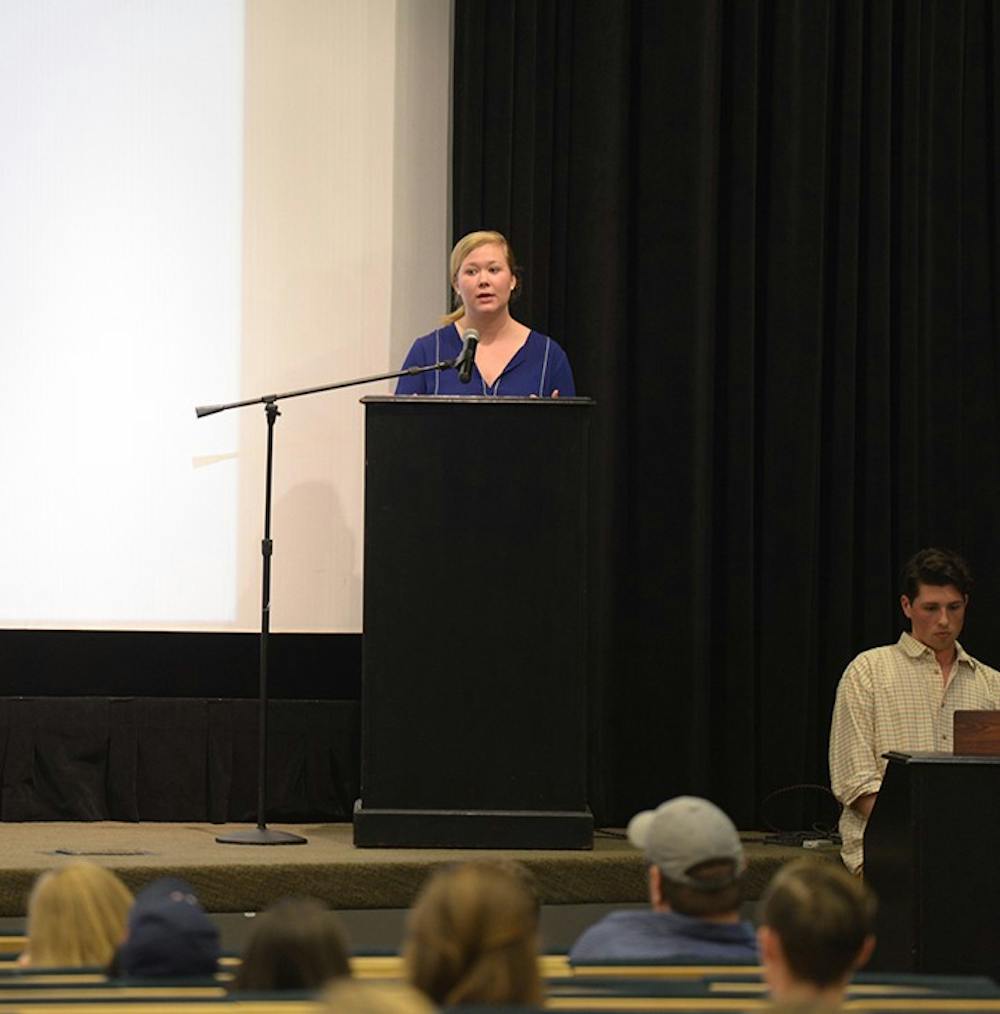The Student Senate met Tuesday night to hear two presentations — one proposing a University food bank and another laying out plans for shuttles to bring students to the polls on Election Day. Both initiatives received over 90 percent support from the contracted independent organization and Student Council members in the audience.
Although this was the second Student Senate meeting of the semester, it was the first in which the attendees voted on whether or not to lend their support to each initiative.
Ty Zirkle, a third-year College student and Student Council’s vice president for organizations, said at the first meeting of the Student Senate that the vote is an opportunity to bring added attention to initiatives that need extra support.
“The purpose of the Student Senate is to present proposals that need to gain the support of the student body to propel them to the administration or the Board of Visitors,” he said at the Sept. 19 meeting.
On Tuesday, the audience first heard from Alex Cintron, a third-year College student and Student Council vice president for administration, who presented the food bank initiative.
According to his presentation, at least 900 University students are at risk of food insecurity, while only about 50 students took advantage of existing resources to alleviate food insecurity provided by the Office of the Dean of Students during the 2016-17 academic year.
“As a solution to this problem, we are proposing the U.Va. student community food bank,” Cintron said. “Several of our peer institutions have already begun similar initiatives.”
He cited existing food bank or food pantry initiatives at Virginia Commonwealth University, George Mason University and Michigan State University.
His presentation laid out the food bank’s mission — to make essential foodstuffs and life goods available for students and staff free of charge in order to combat food insecurity at the University.
After defining the initiative’s purpose, Cintron went into the logistics of the project — the budget, possible locations and community partners that will be involved.
“The driving force behind the initiative will be partnerships with local organizations,” he said. “Madison House volunteers will be tasked with the functioning of the food bank on a day-to-day basis.”
He estimated the cost of the initiative for the 2017-18 school year to be approximately $14,000, some of which he said had been secured from Student Council allocations and the Student Activities Fee. He also noted Student Council has already applied to the Parents Fund to acquire the remaining necessary funding.
In discussing potential locations for the food bank, Cintron mentioned several possibilities but emphasized the Green Room adjacent to Runk Dining Hall as the ideal spot. He said its proximity to the dining hall and its size make it perfect for the food bank — it’s large enough to store the necessary goods, and the dining hall next door will be donating food.
He closed by requesting audience members’ support in cementing the Runk Green Room as the food bank’s home base.
“We’d like the CIO community’s support in overcoming the last great hurdle for this project — acquiring a permanent, suitable location in the Runk Green Room,” he said.
Elizabeth Parker, a fourth-year College student and co-chair of Student Council’s Legislative Affairs Committee, spoke next, presenting on a program to provide shuttles for students to get to the polls on Election Day.
Parker described her efforts in 2016 with the University Democrats to work with the University and community partners to find some way to transport students to polling places.
She believed the issue to be especially salient for first-years, who are not allowed to have cars on Grounds. Coupled with the fact that classes are still in session on Election Day, she worried these students would have no chance to vote.
“We wanted to hone in on these first-years and [Resident Advisors],” she said. “By not providing rides to these students on Election Day, we are disenfranchising them.”
She also noted the complexity of getting to the polls, as students have to go to a variety of different polling precincts on Election Day, depending on where they live.
“Voting at U.Va. is pretty difficult,” Parker said. “In telling the story of the voter shuttles, it’s important to remember there are six polling locations at U.Va.”
By Election Day 2016, she said that CIOs worked together to get a comprehensive list of methods of transportation to each polling place on the University’s parking and transportation website. A community organization called CAR2Vote assisted with transportation, and four SafeRide vans were repurposed to give students rides to the polls.
“The only thing parking and transportation did not do was provide funding,” Parker said.
The total cost of the operation for the 2016 election was $1,600, and the Parents Fund and the Center for Politics covered the cost.
This year, Parker said, all of the same initiatives will be in place, except only three SafeRide vans will be used, as they anticipate lower turnout for this year’s gubernatorial election. This will also keep the costs down, as she said the necessary funding will be between $700 and $900.
Parker closed with a request for CIO support for the initiatives — particularly monetary support.
“We’re in the process of looking for funding sources,” she said. “We’re really looking for funding from CIOs.”
Following the two presentations, the audience members voted electronically on whether or not they supported each initiative. Both received the support of over 90 percent of the students in attendance.
Student Senate will reconvene for its next meeting Nov. 28 in Newcomb Theatre.







